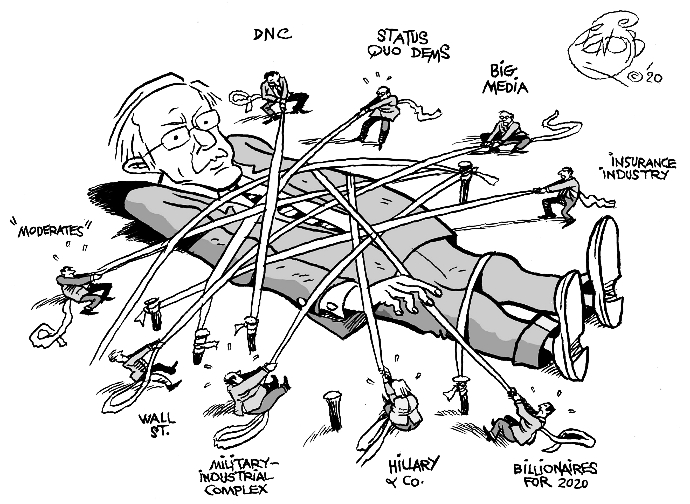Bernie in Lilliput — well, that’s one version of party unity. Cartoon by Khalil Bendib – OtherWords.
Who’s afraid of ‘Socialism’?
by Peter Certo — OtherWords
For decades, Republicans have painted anyone left of Barry Goldwater as a “socialist.” Why? Because for a generation raised on the Cold War, “socialist” just seemed like a damaging label.
And, probably, it was.
You can tell, because many liberal-leaning figures internalized that fear. When Donald Trump vowed that “America will never be a socialist country,” for instance, no less than Senator Elizabeth Warren stood and applauded.
But while older Americans retain some antipathy toward the word, folks raised in the age of “late capitalism” don’t. In Gallup polls, more millennial and Gen-Z respondents say they view “socialism” positively with each passing year, while their opinion of “capitalism” tumbles ever downward.
As a result, it’s not all that surprising that self-described democratic socialist Senator Bernie Sanders tops Trump in most head to head polls — and just scooped up popular vote victories in the Iowa and New Hampshire primaries.
Still, old propaganda dies hard. What else could explain the panicky musings of Chis Matthews, the liberal-ish MSNBC host, who recently wondered aloud if a Sanders victory would mean “executions in Central Park”?
Nevermind that Sanders is a longtime opponent of all executions, as any news host could surely look up. The real issue is a prejudice, particularly among Americans reared on fears of the Soviet Union and Maoist China, that “socialism” implies dictatorship, while “capitalism” presumes democracy.
Their Cold War education serves them poorly.
Yes, it’s easy to name calamitous dictatorships, living and deceased, that proclaim socialist or communist commitments. But it’s just as easy to point to Europe, where democratic socialist parties and their descendants have been mainstream players in democratic politics for a century or longer.
The health care, welfare, and tax systems built by those parties have created societies with far greater equality, higher social mobility, and better health outcomes (at lower cost) than we enjoy here. These systems aren’t perfect, but to a significant degree they’re more democratic than our own.
But we don’t have to look abroad (or to Vermont) for a rich social democratic history.
Milwaukee mayor Daniel Hoan — one of several socialists to govern the city — served for 24 years, and built the country’s first public busing and housing programs. And ruby-red North Dakota is, even now, the only state in the country with a state-owned bank, thanks to a socialist-led government in the early 20th century. Today, dozens of elected socialists hold office at the state or municipal levels.
While plenty of socialists embraced democracy, plenty of capitalists turned to dictatorship.
In the name of fighting socialism during the Cold War, the United States trained and supported members of right-wing death squads in El Salvador, genocidal army units in Guatemala, and a Chilean military regime that disappeared or tortured tens of thousands of people while enacting “pro-market reforms.”
Only last year, the US government was cheering a military coup against an elected socialist government in Bolivia. And in 2018, the Wall Street Journal praised far-right Brazilian leader Jair Bolsonaro, an apologist for the country’s old military regime, for his deregulation of business.
Even here at home, our capitalist “freedoms” have coexisted peacefully with racial apartheid, the world’s largest prison system, and the mass internment of immigrants and their children.
Sanders has been clear his socialist tradition comes from the social democratic systems common in countries like Denmark, with their provisions for universal health care and free college.
Should Matthews next wonder aloud if candidates who oppose Medicare for All or free college also support death squads, genocide, mass incarceration, or internment camps? If that sounds unfair, then so should the lazy fear mongering we get about “socialism.”
The sobering truth is that all political systems are capable of either great violence or social uplift. That’s why we need resilient social movements, whatever system we use — and why we’re poorly served by propaganda from any corner.
The irony of the centrist-progressive debate
by Jim Hightower — OtherWords
With dozens of Democratic candidates, scores of televised debates, and swarms of reporters and pundits descending on the tiniest blip in polls, this campaign already feels never-ending. But at long last, we’re beginning what matters: Voting!
This year, in addition to decisions about candidates, voters will be making a decision about the future of our society. The question we face is whether we will continue the same-old politics of enriching and empowering the few at the expense of the rest of us, or will we pivot to implement transformative structural changes.
As you would expect, Trump and his sycophantic congress critters are howl-at-the-moon opponents of Medicare for All, the wealth tax, tuition-free college and trade school, the Green New Deal, universal child care, and the full package of populist policies that would begin reversing the scourge of inequality that continues spreading throughout our land.
But what about Democrats? Sadly, many of them are opposed, too.
Not grassroots Dems, of course — not the hard-hit, workaday people who need these reforms. But there’s a gaggle of don’t-rock-the-corporate-boat Democrats (mostly old-line pols, consultants, high-dollar donors, and other Washington insiders) who are declaring that the party must abandon proposals for big systemic changes.
Why? Because, they exclaim, being so progressive, so plainspoken, so insistent — so, well, democratic — is frightening voters.
They warn that proposing major new policies to benefit everyone will let the Trumpeteers paint their candidates as scary socialists. They lecture that the proper course is to draw back to the corporate-centered, Clintonesque approach of incremental minimalism: small, technocratic and legalistic tweaks that won’t disrupt the system itself.
This is the responsible path, they assure us, for winning over America’s moderate middle, particularly independent Republicans and white, middle-class swing voters. Never mind that the white middle class is not by and large made up of squishy moderates, but of millions of mad-as-hell, downwardly mobile middle classers who feel abandoned by both political parties.
Still, the establishment is trying to push the party’s candidates to surrender their progressive ideals and just tinker around the edges of actual change.
For example, rather than offering full-fledged health coverage for every man, woman, and child, these minimalists say the safe political route is simply to criticize Republicans for tampering with Obamacare and leave the current profiteering system of “corporate care” untouched — thus leaving millions of our families with poor to zero coverage.
It is simply a lie that people will be scared off by candidates who propose decent health care as a right for every American. As a December New York Times poll reported, 81 percent of Democrats (and two-thirds of independents) support the idea of Medicare for All legislation as proposed by Senator Bernie Sanders and Representative Pramila Jayapal.
Hello — apple pie doesn’t get an approval rating that high!
Or take Senator Elizabeth Warren’s proposal for a tiny wealth tax on mega-fortunes above $50 million — a tax that would finance education, infrastructure expansion, and other crucial programs. In the Times December poll, 77 percent of Democrats, 55 percent of independents, and — check this — 57 percent of Republicans favored Warren’s tax on superfortunes.
Thank goodness such squeamish Dems weren’t able to nullify big public solutions that Americans desperately needed in the past, such as:
- FDR’s Social Security, labor protections, and farm security measures,
- Ike Eisenhower’s interstate highway infrastructure,
- LBJ’s Civil Rights, Medicare, Title IX, and anti-poverty programs,
and even - Nixon’s EPA and OSHA.
As a South Texas saying puts it: “A grandes males, grandes remedios”: for big problems, get big solutions. Obviously, our society’s problems today — from rampant inequality to climate change — are beyond huge. But how big will Democrats go in addressing these challenges?
Contact us by email at fund4thepanamanews@gmail.com
To fend off hackers, organized trolls and other online vandalism, our website comments feature is switched off. Instead, come to our Facebook page to join in the discussion.
These links are interactive — click on the boxes












